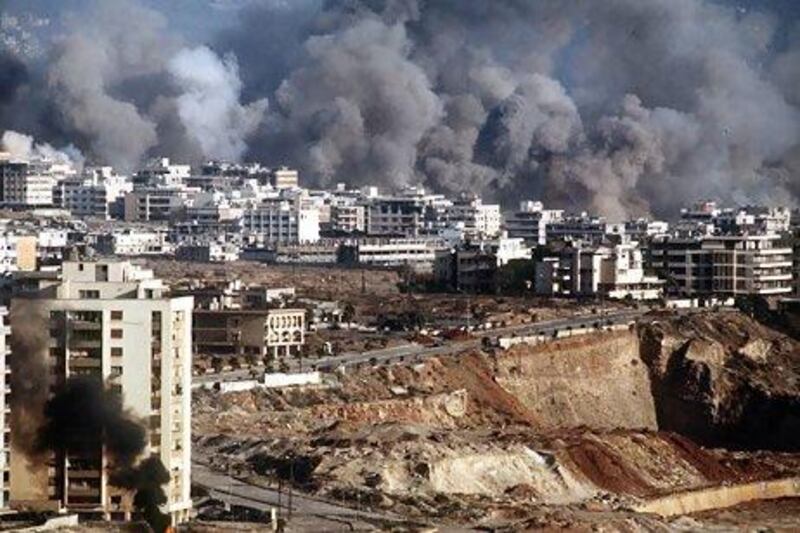LONDON // It was less than a week after the Israeli army invaded Lebanon in June 1982 that Margaret Thatcher, the British prime minister, sat down to write a letter to Ronald Reagan, the US president.
"Dear Ron," the letter began before it listed a series of concerns about Israel's invasion, most conveyed to Britain from Arab leaders such as the UAE's founding president Sheikh Zayed, who urged Mrs Thatcher to intervene to compel Israel to "cease its aggression" .
Mrs Thatcher, however, also added her own. "Unlimited support for Israel can only lead to growing polarisation and despair in the Arab world," Mrs Thatcher cautioned the US president. "I have to tell you from our Arab contacts that Arab opinion is running violently against the United States since the impression has been given, rightly or wrongly, that you condone rather than condemn the recent Israeli action."
A treasure trove of documents was opened late last year when the UK's National Archives released a slew of formerly confidential government papers from 1982. In Britain, most of the coverage has focused on papers relating to the Falklands War between Britain and Argentina that broke out in April of the same year.
But the Israeli invasion of its northern neighbour shortly after that conflict ended - conflagrating Lebanon's civil war - almost immediately consumed the world's attention.
Israel partly justified its invasion as a consequence of the attempted assassination in London of the Israeli ambassador by a splinter group of the Palestine Liberation Organisation (PLO). The documents tell little about the immediate reaction Britain to that attempt but London appeared to consider the matter closed after four members of the Abu Nidal faction, a radical PLO splinter group, were apprehended.
The released papers do document the exhaustive diplomacy surrounding the invasion. They also contain sometimes colourful accounts of those diplomatic manoeuvrings as well as events on the ground from senior British military, intelligence and diplomatic officials.
On June 26, for instance, the British cabinet is informed that 17 hours of negotiations to agree a UN Security Council resolution for a ceasefire and Israeli withdrawal were undermined by "startlingly incompetent and arrogant" French chairmanship, according to the UK's permanent representative to the UN at the time, Anthony Parsons. The negotiations resulted in a US veto, no agreement and left Parsons with the impression that the French were under instructions to veto any proposal from the Brits.
On June 25, meanwhile, the British ambassador to Lebanon, David Roberts, wrote that at least two in the PLO leadership, Yasser Arafat and his right-hand man at the time, Salah Khalaf (Abu Iyad), had "recognised that the game was up".
Roberts predicted internecine Palestinian fighting as a result, suggesting however that there was "no going back on intercourse with the devil", an apparent reference to the compromise the Palestinians needed to find for the PLO to evacuate Lebanon.
The documents also include a letter from Sheikh Zayed, dated June 22, urging Mrs Thatcher to intervene and end the suffering of Lebanese and Palestinians. If it is found, Sheikh Zayed asserted, that the West "applies double standards", such as calling for international law but not compelling Israel to comply, the Arab and Islamic worlds will experience "great resentment and bitterness that will have negative effects on the whole of its relations with the West for the present and future".
Similar warnings poured in from Arab to western capitals. At this point, however, the diplomatic discussion was already focused on who would next host the PLO. Jordan's King Hussein was worried at the prospect of a return of the PLO to Jordan, from where the Palestinian movement had been ousted a decade earlier. Hosni Mubarak, less than a year in the job as leader of Egypt, also had no desire to see Cairo become a new headquarters for the Palestinians.
In an indication of the eventual solution, however, the UK's ambassador to Jordan, Alan Urwick, in July suggested that Mubarak had "agreed" that the Palestinians were "an Arab problem and favoured their dispersal in different Arab countries".
In August and September of that year, thousands of PLO fighters were eventually evacuated from Lebanon under the supervision of a multinational force. The fighters and most of the Palestinian leadership were dispersed to Jordan, Syria, Egypt, Iraq, Sudan, both the Yemens at the time, as well as Tunisia, which became the PLO's new headquarters until 1993.
But the withdrawal of Palestinian fighters ultimately did little for Lebanon, where civil war raged until 1990, and Israel's occupation arguably hasn't ended in spite of its pullback from South Lebanon in 2000. Syria only withdrew its forces in 2005.
The documents released stop in early July 1982, and do not cover the PLO withdrawal from Lebanon, the subsequent massacres of Palestinian civilians in the Sabra and Shatila refugee camps after the Israeli siege of Beirut, or the following year's bombing of the US Embassy in Beirut.
A new batch of documents will be released later this year, covering the rest of 1982 as well as both 1983 and 1984, as Britain adjusts its secrecy laws from 30 to 20 years.






